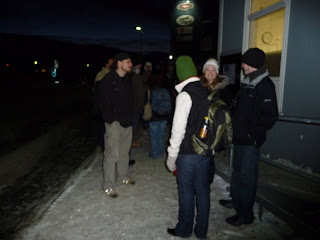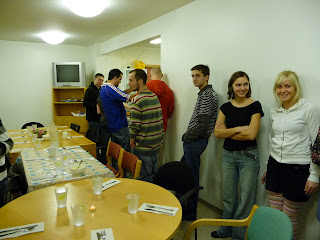
Week two brought many more surprises for the new group of RES students. Half of the group was still at Hotel KEA waiting for the apartments to be vacated by (pried away from) the graduating class. The other half had moved into Skjaldarvik, a converted old-folks home right on the fjord about 8 km north of town. Throughout the past few days, students that would soon be graduating began returning from their various hiding places abroad (or their dorm rooms) where they were doing thesis related research for the past trimester. Their advice, dubious at times, always seemed to stem from some invaluable life lesson:
'Find a good thesis advisor.'
'You are going to work really hard, so learn a lot, but don't be too serious about the whole thing.'
'Beware of the Polish.'
'The student union parties usually have free beer.'
'Try and find somewhere new to travel to every weekend: volcanoes, glaciers, the Arctic Circle, Faroe Islands, Greenland, etc.'
'If you get a rental van stuck in the mud, you have to pay a lot to get it towed out.'
So with these thoughts swirling in my head like the snow swirling sideways by the hotel window, the first day of class was upon us.
Waiting for the public bus to take us to class:
 There is something a little bit unnerving about waiting to catch a bus to class at 9:30 AM with the sun not yet up. The folks that live in Skjaldarvik did not see their new dorm in daylight for a few days since they left in the morning and returned after 4 when it had already become dark. The school's International Director, Arnbjorn Olafsson, was acting as surrogate mother for the day, walking us to the bus stop and seeing us off. This was important since most of us could not get to the Radhustorg bus stop by ourselves if we tried.
There is something a little bit unnerving about waiting to catch a bus to class at 9:30 AM with the sun not yet up. The folks that live in Skjaldarvik did not see their new dorm in daylight for a few days since they left in the morning and returned after 4 when it had already become dark. The school's International Director, Arnbjorn Olafsson, was acting as surrogate mother for the day, walking us to the bus stop and seeing us off. This was important since most of us could not get to the Radhustorg bus stop by ourselves if we tried.The first day was particularly momentous for some, since they were going back to school after many years, while others had been out of school for just a few months. Our first lecture came from the Dean of Students, Bjorn Gunnarsson. It was not until now that we really understood how unique Iceland is from a renewable energy standpoint. 80% of the country's energy use and an amazing 99.5% of all electricity is powered by renewable sources, mostly by hydropower and geothermal power. The real issue holding the country back from having 100% of its energy coming from renewable sources is the dependence on petroleum for transportation vehicle use. This will be mitigated in the future as hybrid technologies are improved.
Our classroom:
 This is the building where our classes will take place for the first trimester. After that, each specialization will split off and get their own room in different places. For now, everyone is taking classes together. Our first professor was Dr. Dean Abrahamson, from the University of Minnesota. His course, titled Energy: Past, Present, and Future, was a little depressing at the start. It is pretty much unanimously agreed upon in the scientific community that massive changes need to be undertaken in the next couple decades or the planet will be irreparably changed by 2050. Food supplies will be threatened, the oceans will become more acidic, new diseases will appear, weather patterns will intensify, and millions of square miles of coastline will be under water. It is possible for London to resemble Venice by the end of this century if things are left unchanged.
This is the building where our classes will take place for the first trimester. After that, each specialization will split off and get their own room in different places. For now, everyone is taking classes together. Our first professor was Dr. Dean Abrahamson, from the University of Minnesota. His course, titled Energy: Past, Present, and Future, was a little depressing at the start. It is pretty much unanimously agreed upon in the scientific community that massive changes need to be undertaken in the next couple decades or the planet will be irreparably changed by 2050. Food supplies will be threatened, the oceans will become more acidic, new diseases will appear, weather patterns will intensify, and millions of square miles of coastline will be under water. It is possible for London to resemble Venice by the end of this century if things are left unchanged.So with this sense of urgency and maybe just a little bit of pessimism about this immensely daunting task class began. The first few classes were very factual, and the information is not really open to interpretation. The US uses 21 million barrels of oil daily. CO2 is heinously bad if left to spiral out of control. Canada has the highest per capita energy use (that came out of left field).
That weekend, Valentines Day actually, we had a welcome event hosted by the graduating class.
Both classes in attendance:

The event was a pub quiz trivia night, with Icelandic, renewable, and movie themed questions. My team placed second and was the proud winner of 5 beers. The quiz was a welcome distraction from hotel living for us and from thesis defenses for the older students.
That Sunday, the residents of Skjaldarvik hosted a housewarming party and cooked dinner for the whole class. 6+ kg of spaghetti and a half dozen baguettes fed the group.
Waiting anxiously:

Digging in:

With the close of this week, the next would bring our first assignment, a group project and presentation. Topics ranging from building efficiency to nuclear power to country profiles were coming together into reports and powerpoints, ready for presenting.
"Beware of the Polish"
ReplyDeleteWho gave you such an advice??? I object!!!